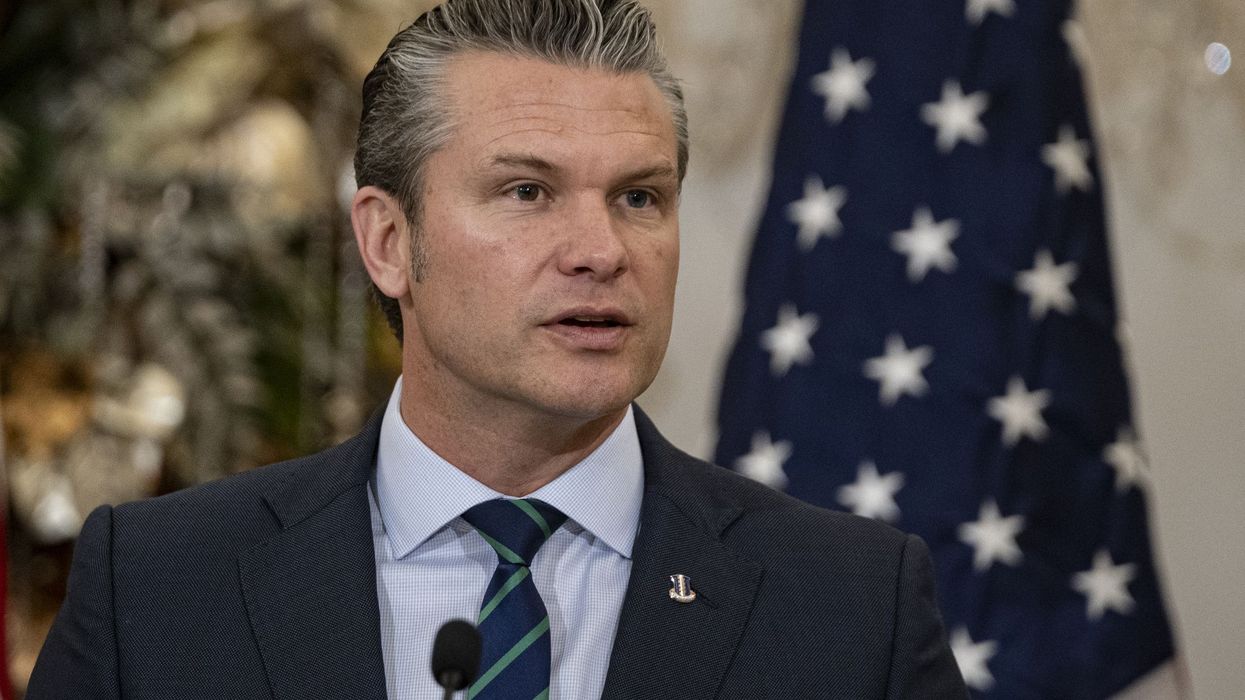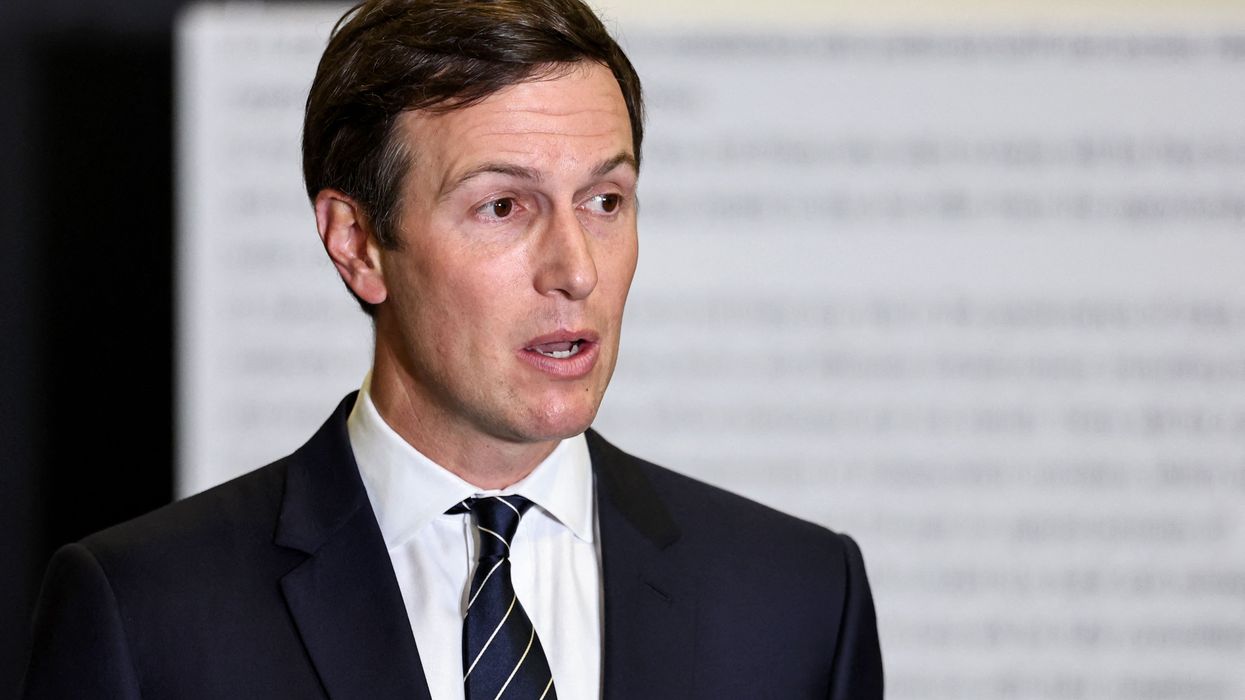January, 30 2018, 10:15am EDT

For Immediate Release
Contact:
Email:,info(at)fwwatch(dot)org,Seth Gladstone -,sgladstone@fwwatch.org
Democracy Forward Launches Infrastructure Accountability Initiative, Releases New Report Highlighting Trump's "Blueprint for Cronyism"
Series of Lawsuits, Reports and Joint Actions with Food & Water Watch to Probe Illegally Crafted Infrastructure Plan; Expose Financial Conflicts of Trump Inner Circle.
WASHINGTON
As President Trump rolls out his long-awaited infrastructure plan, Democracy Forward launched a new Infrastructure Accountability Initiative, a series of actions designed to hold the Trump Administration accountable for an infrastructure plan that is poised to enrich Trump's cronies at the expense of the American people. As the first action in this new initiative, today Democracy Forward released "Blueprint for Cronyism," a new report highlighting the illegal development of the Trump Administration's plan and analyzing how it would lay the groundwork for rampant cronyism moving forward.
"What the American people will see is an infrastructure plan designed in secret by a council endowed with more power than Dick Cheney's infamous and self-enriching Energy Task Force," said Corey Ciorciari, Policy and Strategy Director for Democracy Forward and a lead author of the report. "This is a plan for maximum cronyism."
Released before President Trump's State of the Union, "Blueprint for Cronyism" explains how Trump's infrastructure plan "appears to allow the Administration to award new infrastructure grants directly to private companies, empower companies to charge tolls and fees on America's roads and bridges, cut career officials and agency experts out of project and permitting decisions, and eliminate regulatory and legal safeguards that protect against corruption."
The Infrastructure Accountability Initiative will also include a series of lawsuits and joint actions with Food & Water Watch. In the coming weeks, the two groups will file new briefs in their suit against the Administration for illegally developing infrastructure policy in violation of federal transparency laws. The initiative will also include additional legal actions targeting communications between cabinet officials and Trump's inner circle, probing foreign involvement in the President's infrastructure plans, and uncovering attempts by Jared Kushner to personally profit off the President's plan.
"Trump's infrastructure plan will likely turn over urgent infrastructure projects, like public water, to his associates on Wall Street to turn a quick profit. It would also fast track destructive fossil fuel infrastructure, like pipelines, so the industry can expand without regard for the health and safety of communities and the planet," said Wenonah Hauter, executive director of Food & Water Watch. "We need to shine a light--a big, giant spotlight--on the infrastructure dealings of this administration. It has shown over and over again that it sides with billionaire interests, not the public interest."
When introducing his "Infrastructure Council" in January, President Trump staffed the group with his business associates and friends, including real estate moguls Richard Lefrak, Steven Roth, and infrastructure venture capitalists William "Bill" Ford and Joshua Harris. The President has relied both upon members of this illegal Infrastructure Council and staff of the Jared Kushner-led White Office of American Innovation.
These advisors operated behind closed doors for months, holding secret meetings, soliciting and reviewing project proposals, and recommending regulatory actions. In fact, President Trump has already taken actions on infrastructure that prioritize the interests of people like his family and business associates over the needs of American communities.
"As Congress and the public consider President Trump's infrastructure proposal, they should consider the illegal way the proposal was crafted behind closed doors, the self-dealing infrastructure actions President Trump has already taken, and the ways in which the plan is ripe for abuse," the report states. "Then they should ask a simple but critical question: Who would President Trump's plan benefit, and who would it hurt?"
The report was issued on Tuesday January 30, 2018 and the full report can be found here.
Food & Water Watch mobilizes regular people to build political power to move bold and uncompromised solutions to the most pressing food, water, and climate problems of our time. We work to protect people's health, communities, and democracy from the growing destructive power of the most powerful economic interests.
(202) 683-2500LATEST NEWS
Hegseth Says Pentagon Project Will Put Artificial Intelligence 'Into the Hands of Every American Warrior'
The new website, GenAI.mil, describes the "end state" of the project as "a Joint Force where generative AI is fully integrated as a native capability into every aspect of operations."
Dec 09, 2025
US Defense Secretary Pete Hegseth, currently under fire for treating a deadly ongoing US military operation against alleged drug traffickers in the Caribbean "like it's a video game," as one columnist said this week, announced on Tuesday that the Pentagon is launching an artificial intelligence platform for service members to use on the proverbial battlefield.
"We are unleashing GenAI.mil," said Hegseth in a video address on the Department of Defense's (DOD) embrace of AI. "This platform puts the world's most powerful frontier AI models, starting with Google Gemini, directly into the hands of every American warrior."
Hegseth, who has claimed the DOD is now called the Department of War, said that "at the click of a button," service members can "conduct deep research, format documents, and even analyze video or imagery at unprecedented speed."
"We will continue to aggressively field the world's best technology to make our fighting force more lethal than ever before," added Hegseth.
Pete Hegseth: "The future of American warfare is here, and it's spelled AI."
He says the military has launched a new platform that "puts the world's most powerful frontier AI models, starting with Google Gemini, directly into the hands of every American warrior." pic.twitter.com/phva2cnIc9
— More Perfect Union (@MorePerfectUS) December 9, 2025
Jessica Burbank and Drop Site News reported that the custom-made Google AI tool, Gemini, is now available to all military personnel, civilians, and contractors, and includes extensions to tools including ChatGPT, AI assistant Claude, and Grok.
The Trump administration awarded Google a $200 million contract in July to develop AI at the DOD.
"Victory belongs to those who embrace real innovation," Hegseth wrote in a memo obtained by Burbank. "GenAI.mil is part of this monumental transformation... I expect every member of the department to log in, learn it, and incorporate it into your workflows immediately. AI should be in your battle rhythm every single day."
DOD employees have been given a "Do and Don't" list, according to Burbank.
A Pentagon source told Burbank that an “example of 'don’t' was, 'Don’t use GenAI for decisions involving attribution, targeting, or threat evaluation without human validation.'"
"I read that as someone can read what the AI said and be like, 'Yep it’s good to go shoot that missile,'" added the source. “They are legit going full force into AI."
GenAI.mil also describes the "end state" that the Pentagon is working toward as "a Joint Force where generative AI is fully integrated as a native capability into every aspect of operations."
"Our warriors and leaders will leverage AI to achieve unparalleled situational awareness, accelerate planning cycles, and execute operations with a speed and precision that yields information dominance and mission success," reads the platform.
The launch of Google Gemini comes after Emil Michael, the defense undersecretary for research and engineering, took control of the Defense Innovation Unit, the Chief Digital and Artificial Intelligence Office (CDAO), and other offices in an effort to accelerate the expansion of AI use in the military.
Between Russia and Ukraine, Michael said, "You have a robot-on-robot frontline now, which we've never seen before."
“The explosion of capabilities has been enormous, and we're just catching up to that,” he added. “Now we can take CDAO and actually try to use it to push the capability into the department for actual use cases.”
Drop Site co-founder Ryan Grim commented that Tuesday's announcement points to "Hegseth ushering in the apocalypse."
The launch of GenAI.mil comes as the Trump administration continues to escalate tensions with Venezuela, with President Donald Trump signaling that the US could soon launch land strikes in the South American country and elsewhere in Latin America.
Keep ReadingShow Less
'Attack on Independent Science': Trump EPA Removes All Mention of Human-Caused Climate Crisis From Public Webpages
Climate scientist Daniel Swain called it "a deliberate effort to misinform."
Dec 09, 2025
The Trump administration has removed all references to human-caused climate change from Environmental Protection Agency webpages, as well as large amounts of data showing the dramatic warming of the climate over recent decades and the resulting risks.
According to a Tuesday report from the Washington Post, one page on the "Causes of Climate Change" stated as recently as October that "it is unequivocal that human influence has warmed the atmosphere, ocean, and land," a statement that reflects the overwhelming consensus in peer-reviewed literature on climate.
That statement is now nowhere to be found, with those that remain only mentioning "natural" causes of planetary warming like volcanic activity and variations in solar activity.
"The new, near-exclusive emphasis on natural causes of climate change on the EPA's website is now completely out of sync with all available evidence demonstrating overwhelming human influence on contemporary warming trends," explained Daniel Swain, a climate scientist at the University of California Agriculture and Natural Resources, who posted about the changes on social media.
The Intergovernmental Panel on Climate Change (IPCC), which examines tens of thousands of studies from around the globe, found that virtually all warming since the dawn of the industrial era can be attributed to human carbon emissions.
This can be confirmed using the Wayback Machine's last snapshot (from Oct 8, 2025). At some point between Oct 8 & Dec 8, major changes were made to this and other EPA climate change content. Information has either been removed completely or "adjusted" to emphasize natural causes.
[image or embed]
— Daniel Swain (@weatherwest.bsky.social) December 8, 2025 at 12:50 PM
Pages about the catastrophic results of climate change have also been scrubbed: One of them allowed users to view several climate change indicators, like the historic decline of Arctic sea ice and glaciers and the increased rates of coastal flooding due to rising sea levels. That page has been deleted entirely.
Another page, which answered frequently asked questions about climate change, now no longer includes questions like, "Is there scientific consensus that human activities are causing today’s climate change?” "How can people reduce the risks of climate change?" and "Who is most at risk from the impacts of climate change?" The page provides no indication that climate change is a human-caused phenomenon, instead only discussing natural factors.
That page links to another that has since been deleted. It once provided extensive information about the risks climate change poses to human health, "from increasing the risk of extreme heat events and heavy storms to increasing the risk of asthma attacks and changing the spread of certain diseases carried by ticks and mosquitoes." Another deleted page discussed the impacts of climate change on children's health and low-income populations.
“This is, I think, one of the more dramatic scrubbings we’ve seen so far in the climate space,” said Swain. "This website is now completely incorrect regarding the changes in climate that we’re seeing today and their causes... It’s clearly a deliberate effort to misinform.”
During his 2024 campaign for reelection, President Donald Trump and his affiliated super political action committees received more than $96 million in direct contributions from oil and gas industry donors, according to a January report from Climate Power. Since retaking office, he has moved to dramatically expand the extraction and use of planet-heating fossil fuels while eliminating investment in clean energy and electric vehicles.
Rachel Cleetus, senior policy director for the Climate and Energy Program at the Union of Concerned Scientists, said, "Deleting and distorting this scientific information only serves to give a free pass to fossil fuel polluters who are raking in profits even as communities reel from extreme heatwaves, record-breaking floods, intensified storms, and catastrophic wildfires."
Cleetus said that the purging of climate information from EPA sites was a prelude to "the likely overturning of the endangerment finding, a legal and scientific foundation for standards to limit the heat-trapping emissions driving climate change and threatening human health."
In July, EPA Administrator Lee Zeldin unveiled a proposal to rescind the 2009 finding, which determined that climate change endangers human life and serves as the legal basis for greenhouse gas regulations under the Clean Air Act.
Undermining climate science is core to that effort, which Andrew Dessler, a climate scientist at Texas A&M, said at the time, "could unravel virtually every US climate regulation on the books, from car emissions standards to power plant rules.”
Shortly after Zeldin announced the rule change, the Department of Energy cobbled together a “Climate Working Group” comprising five authors handpicked by Secretary Chris Wright to produce a climate report that disputes the IPCC's findings and the scientific consensus on climate change.
The report did not undergo peer review and omitted around 99% of the scientific literature the IPCC relied on for its comprehensive findings. A group of climate scientists that independently reviewed the paper found that it “exhibits pervasive problems with misrepresentation and selective citation of the scientific literature, cherry-picking of data, and faulty or absent statistics.”
Cleetus said Tuesday that “EPA is trying to bury the evidence on human-caused climate change, but it cannot change the reality of climate science or the harsh toll climate impacts are taking on people’s lives... This isn’t just about data on a website; it’s an attack on independent science and scientific integrity.”
Keep ReadingShow Less
Kushner Role in Paramount Scheme Shows US 'Devolving Into Caricature of Crony Capitalism'
"The Warner Bros. merger was already suspect, but now Trump’s family is getting in on the act," said one Democratic senator.
Dec 09, 2025
The revelation that Jared Kushner, US President Donald Trump's son-in-law, is playing a key role in Paramount Skydance's hostile bid for Warner Bros. Discovery underscores the extent to which the current administration's open corruption "is fundamentally distorting economic and governmental policymaking at the direct expense of the interests of the American people," a watchdog group said Tuesday.
Kushner's private equity firm, Affinity Partner, is listed in a regulatory filing as one of the organizations financing Paramount's $108 billion bid for Warner Bros., which owns CNN. Ethics experts say Kushner's involvement represents another glaring conflict of interest on top of preexisting concerns about the bid, stemming from Trump's relationship with Paramount CEO David Ellison and his billionaire father, GOP megadonor Larry Ellison.
"America is devolving into a caricature of crony capitalism," Robert Weissman, co-president of Public Citizen, said in a statement Tuesday. "Factions aiming to shrink media competition are fighting over who can show the greatest fealty to Donald Trump. Paramount seems to have won the prize, bringing in presidential son-in-law Jared Kushner—whose investment vehicle is flush with Saudi funds, deposited only because of his personal relationship with Donald Trump—as a partner."
"A working antitrust policy would block the merger of Warner Bros. Discovery with one of the existing media goliaths. It would never be influenced by personal connections to the president," Weissman added. "This case underscores that the corruption pervading the Trump administration isn’t just about making Trump and his family and hangers-on ever richer. That corruption is fundamentally distorting economic and governmental policy making, at the direct expense of the interests of the American people.”
Sen. Chris Van Hollen (D-Md.) said that "the Warner Bros. merger was already suspect, but now Trump’s family is getting in on the act."
"Paramount already had deep ties to the White House," he added, "now Trump's family will directly profit if they win."
Asked Monday about Kushner's financing role, Trump said he has "never spoken to him about it."
Paramount, which the Trump administration reportedly favored to take over Warner Bros., announced its bid for the company days after the streaming behemoth Netflix and Warner Bros. leadership reached an $83 billion acquisition deal. The president immediately criticized the Netflix agreement and pledged to intervene in the federal review process.
"The blurred line between running the government and the family's business interests is expanding each day," Scott Amey, general counsel with the Project On Government Oversight, told Reuters.
Antitrust experts and advocates have argued that both of the proposed mergers are likely illegal and should be blocked.
Matt Stoller, research director at the American Economic Liberties Project, said Monday that either merger "would further deepen the media consolidation crisis that is eroding our creative economy and freedom of expression."
"Paramount specifically would be well-positioned to manipulate the news to please the president, which David Ellison made clear it intends to do in an interview earlier today," said Stoller. "There is a reason that policymakers and workers in Hollywood have come out against each iteration of this deal. Rather than allowing further consolidation in the industry, policymakers must reregulate the market with prohibitions on vertical integration.”
Keep ReadingShow Less
Most Popular


